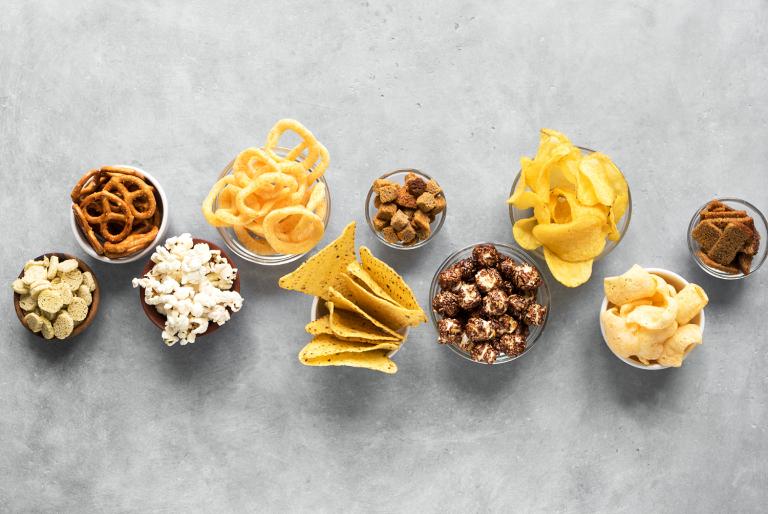Carbohydrates in Your Diet
Breaking the Carb Craving Cycle
Taste for Life: If you have developed a carb-eating cycle during COVID due to working from home and needing “comfort” from food, how do you break this cycle of eating?
Jonny Bowden: Start in the morning, because that’s when the craving cycle starts. Go for a higher-protein, higher-fat breakfast (eggs and avocado, for example). If you need to add some carbs, make them slow-burning carbs like oatmeal (not the instant kind).
Keep it simple and follow one basic rule: Eat real food, food your great-great-grandmother would have known what to do with. Food that would spoil if left outside for 48 hours.
If you eat real food—complete with whatever fat comes with it—you’ll be on the way to re-building a healthy metabolism.
You won’t have to eat “every two hours” if your body “knows” how to run on fat. You only have to eat every few hours if you have a “sugar-burning metabolism.” A sugar-burning metabolism is the result of eating too much sugar, starch, and processed carbohydrates.
If you want a fat-burning metabolism, guess what you’ve got to eat? Fat! You have to train your body to run on this (far superior) source of fuel. But it will be worth it!
Is Keto for Everyone?
TFL: Should everyone try to follow a keto diet?
JB: No. Not because the keto diet isn’t great, but because there’s no diet in the world that everyone should be following 100 percent of the time, unless you call the “Only Eat Real Food Diet” a diet!
Keto diets are terrific for certain people who can live on them most of the time and thrive, for others who use them cyclically, and for still others who use them as interventions for specific conditions, including diabetes and obesity.
But they’re not without challenges, and they’re not ideal for everyone!
Healthy Fats and Oils
Getting Healthy Fats in Your Diet
TFL: If you would like some of the benefits of eating healthy fat without having to adopt a particular diet, what is the best way to modify what/how you eat so you can still reap the benefits of healthy fats?
JB: That’s a great question. I commend you for asking it because it brings up one of my favorite things, something I call “flirting with ketosis.” As your question implies, you don’t have to be fanatic about adopting any particular diet to get all the benefits of healthy fat.
Look at the overlap between “diets” like Paleo, Whole30, Keto, Atkins, Bulletproof, even Carnivore. What do they have in common? Low sugar, high fat! The rest are details.
You do not have to follow any specific dietary orthodoxy to get the benefit of eating from what I call “The Jonny Bowden Four Food Groups”: food you could have hunted for, fished, gathered from the ground, or plucked from a tree.
Healthy fats such as extra-virgin olive oil, grass-fed butter, ghee, Malaysian palm oil, coconut oil, the fat in grass-fed dairy, which has now been shown to have health properties … all these are natural healthy fats, some of them are vegetarian friendly (like coconut and Malaysian palm), some of them are from animals, but all of them are healthy, noninflammatory sources of calories. Many of them also have specific health properties, such as the tocotrienols in Malaysian red palm oil or the polyphenols in extra-virgin olive oil.
Again, remember you don’t need to follow any specific dietary regimen to get the benefits of adding more of these fats in your diet! Just substitute them for the sugars and empty carbs now taking up space on your plate!
The Benefits of Saturated Fats
TFL: What are some of the health studies that indicate there’s a benefit in some saturated fats?
JB: Let’s start with the studies that clearly demonstrate there’s no harm in saturated fats.
A decade ago, a large meta-analysis came out in the highly regarded peer-reviewed Journal of Clinical Nutrition that absolved saturated fat of any causal role in heart disease.
In 2014, another study (in the Annals of Internal Medicine) said the same thing.
And recently, a wonderful study out of Malaysia looked at dietary eating patterns in cultures where the vast majority of fat comes from Malaysian palm oil, which has a high concentration of saturated fat, about 50 percent. The study found that the amount of fat people ate had almost no effect on their cardiovascular risk, but the amount of carbohydrates did!
Speaking of Malaysian red palm oil, which is a perfect example of a plant-based saturated fat, its healthy components are visible to the naked eye! It’s red because it’s loaded with carotenoids!
And let’s not forget its tocotrienol content. Tocotrienols—a component of vitamin E—have been shown to attenuate brain damage after a stroke, and palm oil is a major source of tocotrienols.
Healthy Cooking Oils
TFL: Which oils should be used for cooking?
JB: One of the things to remember with oils is that there’s almost always a tradeoff between two variables: How refined is the oil? And how hot can you heat it?
Unfortunately, the less refined oils—which are nutritionally richer—are also much more vulnerable to high heat. The higher up you go on the “refining” scale, the higher the heat the oil can tolerate.
Knowing the proper range of heat to apply to an oil is very important.
For higher heat, I love avocado oil, macadamia nut oil, and Malaysian palm oil. Slightly refined coconut oil stands up to heat pretty well also! I like grass-fed butter and ghee, and, once in a while, a cold-pressed sesame oil, which is rich in nutrients called lignans.
I love extra-virgin olive oil, which—contrary to popular opinion—you can use for sautéing, though I still prefer to use it as a dressing or drizzle. Slightly refined olive oil—i.e. virgin as opposed to extra-virgin—will tolerate higher heat.
In general, I’m not a fan of commercial cooking oils. They are very high in pro-inflammatory omega-6s, and have been processed and refined within an inch of their lives. Worst offenders: corn, sunflower, safflower, and soybean. Remember also that almost all soybean and canola oils are GMO.
Oils like flax, fish and chia are terrific, but in general shouldn’t be used for cooking.

